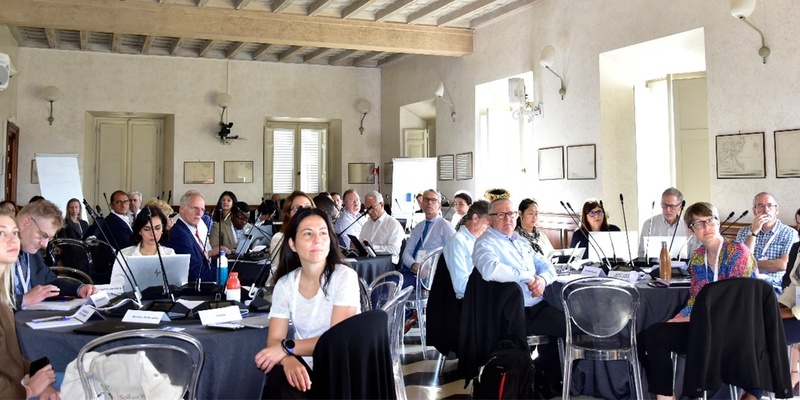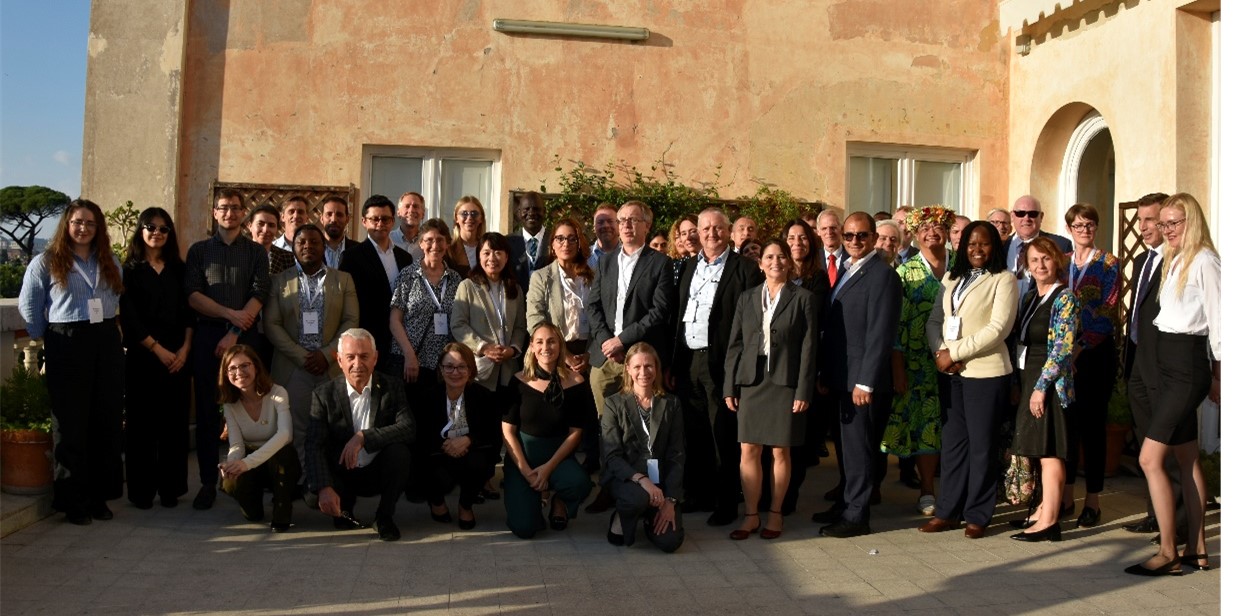Les organes directeurs de la CIPV discutent des projets visant à faire progresser les travaux sur la santé des végétaux et les questions phytosanitaires à l’échelle mondiale
Posted on lun, 18 Nov 2024, 07:05

Les membres du Groupe de la planification stratégique écoutent le compte rendu des travaux menés en petits groupes © FAO/Anita Tibasaaga
Rome, 31 octobre 2024 – Le Bureau de la Commission des mesures phytosanitaires (CMP) et le Groupe de la planification stratégique se sont réunis à Rome (Italie) fin octobre pour passer en revue les initiatives et les projets menés par la Convention internationale pour la protection des végétaux (CIPV) en vue de faire progresser ses travaux et ceux de la communauté phytosanitaire.
Le Bureau de la CMP supervise le programme de travail de la CIPV en veillant à ce qu’il soit conforme au Cadre stratégique de la CIPV. Il définit également l’orientation stratégique ainsi que les aspects financiers et opérationnels de la CMP. Le Groupe de la planification stratégique est un organe subsidiaire de la CMP. Il propose à la communauté de la CIPV des idées et des recommandations stratégiques.
Les discussions du Bureau de la CMP ont porté sur l’établissement de l’ordre du jour de la prochaine réunion annuelle de la CMP – le principal organe directeur de la CIPV – en 2025 (CMP-19), le financement durable des initiatives de la CIPV telles que la solution ePhyto de la CIPV, et les progrès réalisés dans la mise en œuvre des éléments du Programme de développement du Cadre stratégique de la CIPV 2020-2030. Chaque groupe relatif aux éléments du Programme de développement rendra compte à la CMP-19 des examens à mi-parcours concernant les progrès accomplis et les exigences à respecter pour faire avancer leurs travaux. Le Bureau a retenu trois thèmes potentiels pour les séances parallèles à la CMP-19, à savoir: les normes relatives aux marchandises, la planification des mesures d’urgence des initiatives mondiales relatives aux organismes nuisibles d’apparition récente et aux algues marines, ainsi qu’une séance scientifique sur l’approche «Une seule santé». En outre, le Groupe de la planification stratégique a recommandé des thèmes pour les futures séances parallèles, notamment le Programme phytosanitaire africain (PPA), la race tropicale 4 (TR4) de Fusarium oxysporum f.sp. cubense (Fusarium TR4), les expériences d’utilisation de l’intelligence artificielle dans le domaine phytosanitaire, les approches systémiques et le commerce électronique.
La Directrice générale adjointe de l’Organisation des Nations Unies pour l’alimentation et l’agriculture (FAO) et responsable du Secrétariat de la CIPV, Mme Beth Bechdol, a assisté à la réunion du Bureau de la CMP et a salué le travail remarquable effectué par la communauté de la CIPV. Elle a rappelé l’importance des travaux menés par la CIPV pour promouvoir la santé des végétaux dans le cadre de l’approche «Une seule santé» et s’est dite favorable à ce que le thème «Une seule santé» soit retenu pour la Journée internationale de la santé des végétaux 2025.
La Directrice générale adjointe de la FAO a souligné la nécessité d’un financement durable et a également appelé à renforcer la collaboration sur la solution ePhyto de la CIPV avec les représentants permanents auprès de la FAO. Au cours de la réunion, le Bureau de la CMP a indiqué que le Secrétariat de la CIPV a beaucoup progressé dans la mise en place d’un Fonds d’affectation spéciale multidonateurs pour la solution ePhyto de la CIPV. Le Secrétariat invitera les parties contractantes à contribuer à ce Fonds à partir de 2025, en vue d’assurer un financement durable pour la solution ePhyto.
Mme Bechdol a également salué les progrès accomplis dans la mise en œuvre du Programme phytosanitaire africain (PPA), précisant qu’il a connu un bon démarrage et a été bien accueilli, mais qu’il doit encore devenir autosuffisant. Le Bureau réexaminera cette question lors de sa réunion de décembre.
Le Bureau a également été informé de l’avancée des travaux du Secrétariat de la CIPV et des groupes de réflexion de la CMP sur les conteneurs maritimes, la coordination mondiale de la recherche phytosanitaire, l’approche «Une seule santé», les changements climatiques et les questions phytosanitaires, ainsi que la sécurité de la fourniture de l’aide alimentaire et d’autres aides humanitaires.
Réunion du Groupe de la planification stratégique

Les membres du Groupe de la planification stratégique aux côtés du personnel de la FAO et du Secrétariat de la CIPV © FAO/Anita Tibasaaga
Cette année, les discussions du Groupe de la planification stratégique ont porté sur l’amélioration des normes phytosanitaires, la mobilisation des ressources et le renforcement des capacités. La réunion s’est déroulée en petits groupes pour permettre aux membres de participer pleinement aux travaux. Elle a été l’occasion de procéder à une analyse de l’environnement de la CIPV, en déterminant ses atouts et faiblesses ainsi que les défis et opportunités auxquels elle est confrontée. Ses atouts sont le Cadre stratégique de la CIPV 2020-2030, les 185 parties contractantes, le dévouement des membres de la communauté de la CIPV, des organes directeurs et des comités de la CMP, ainsi que les initiatives porteuses de transformation telles que la solution ePhyto de la CIPV. Le Groupe de la planification stratégique a souligné la capacité de la CIPV à étudier des opportunités telles que l’utilisation de l’intelligence artificielle pour améliorer les processus opérationnels, la mise en place d’une accréditation de la CIPV pour les laboratoires de diagnostic et la participation des jeunes aux activités relatives à la santé des végétaux. Parmi les principaux défis figurent le besoin de ressources financières et techniques supplémentaires pour soutenir l’action de la CIPV ainsi que la nécessité de trouver des moyens d’accroître la visibilité. D’autres sujets de discussion ont été abordés: l’accélération de l’établissement des normes phytosanitaires, les propositions de thèmes pour la prochaine Journée internationale de la santé des végétaux, le système d’alerte et d’intervention de la CIPV en cas d’apparition de foyers d’organismes nuisibles (POARS), la prochaine Conférence internationale sur la santé des végétaux et la prochaine version du Cadre stratégique de la CIPV.
Le Groupe de la planification stratégique a également entendu les exposés des parties contractantes sur la pertinence des normes internationales pour les mesures phytosanitaires (NIMP), la résistance aux antimicrobiens dans le domaine phytosanitaire, l’approche systémique et l’élaboration de normes et d’orientations internationales. Le Groupe de la planification stratégique a recommandé que les problèmes relatifs aux NIMP et les possibilités d’amélioration des NIMP soient davantage étudiés pour garantir que ces normes répondent aux besoins des parties contractantes, quel que soit leur état d’avancement.

